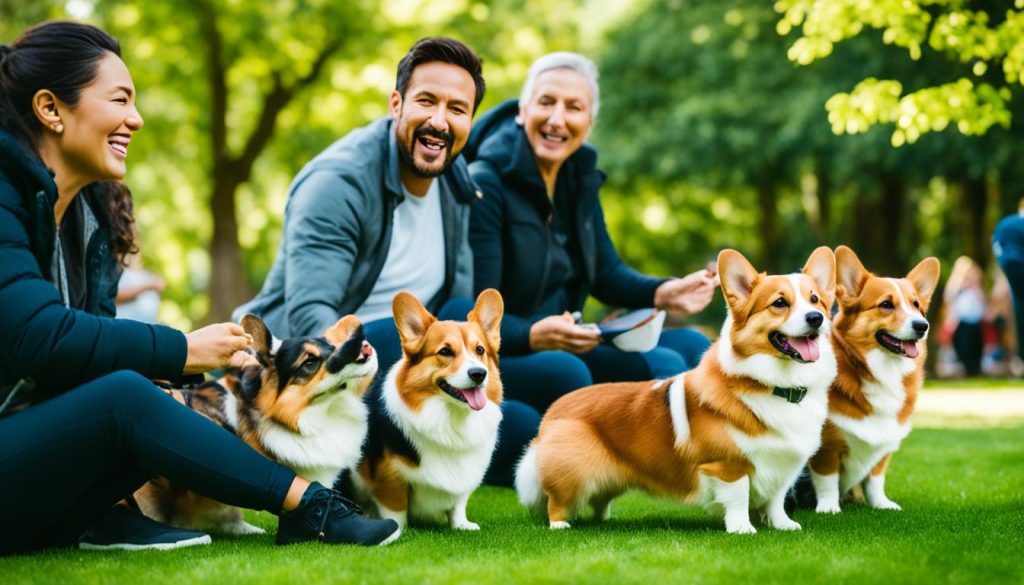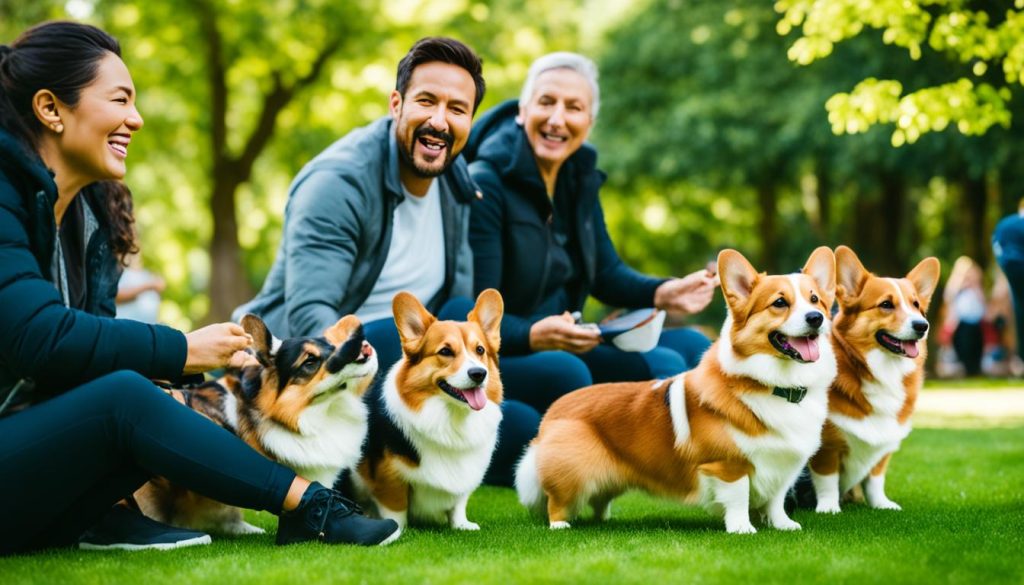Pembroke Welsh Corgi training is an essential part of ensuring their development and well-being. Corgis are intelligent and energetic dogs that require guidance and instruction to exhibit proper behaviors. From obedience training to house training, leash training, and crate training, there are specific techniques that can help you raise a well-behaved and happy Corgi.
During the early stages of their growth, between 8-16 weeks and 6 months, it is crucial to focus on their training and socialization. This is the time when they are most receptive to learning and forming positive associations. By establishing a foundation of good behavior, you can set your Corgi up for a lifetime of obedience and happiness.
Pembroke Welsh Corgi Training
- Pembroke Welsh Corgi training is crucial for their development and well-being.
- Start training and socializing your Corgi during their growth stages.
- Focus on obedience training, house training, leash training, and crate training.
- Use positive reinforcement techniques to reward good behavior.
- Establish a foundation of basic commands and expose your Corgi to various environments.
Socializing Your Corgi with People
Socializing corgis with people is a crucial aspect of their development and behavior. It is essential to expose them to different individuals and social situations from an early age. By doing so, we can help them become comfortable around new people and build their social skills. In this section, we will explore effective strategies for training corgis to meet new people and the importance of socialization for their overall well-being.
Beginning at around eight weeks old, it is recommended to take your corgi to busy areas where they can interact with strangers. This exposure will gradually help them become more comfortable around new individuals and reduce any fear or anxiety they may have. It is important to introduce them to a variety of people, including adults, children, and individuals of different ethnicities and ages.
During socialization sessions, remember to use positive reinforcement techniques such as treats and praise to reward your corgi for their good behavior. This will help them associate meeting new people with positive experiences and further reinforce their social skills.
Additionally, it is important to expose your corgi to different environments and situations where they can interact with people. Take them to parks, outdoor events, and other social gatherings where they can observe and interact with strangers. Gradually increase the level of exposure as your corgi becomes more comfortable, always providing them with reassurance and positive reinforcement.
Socialization is an ongoing process, and it is important to continue exposing your corgi to new people throughout their life. Regularly organizing playdates, visits to friends and family, or attending dog-friendly events can help maintain their social skills and prevent any regression.
Remember, each corgi is unique, and their socialization needs may vary. Observe your corgi’s behavior and comfort level during socialization activities, always ensuring their well-being and emotional state. With patience, consistency, and positive reinforcement, you can train your corgi to be a well-socialized and confident companion.

Grooming Your Corgi
Corgis are known for their adorable appearance and distinctive double coat. To keep your Pembroke Welsh Corgi looking their best, regular grooming is essential. Here’s a grooming routine for corgis that will help maintain their coat and overall health.
1. Brushing Your Corgi
Regular brushing is crucial for managing shedding and preventing matting in your corgi’s coat. Use a slicker brush or a shedding rake to gently remove dead hair from both the topcoat and the soft undercoat. Daily brushing sessions not only keep their coat healthy but also provide an opportunity for bonding with your furry friend.
2. Introducing a Blow Dryer
It’s important to introduce a blow dryer to your corgi early on to get them accustomed to the noise and sensation. Start by using the dryer on a low setting while keeping a safe distance from your pet. Gradually increase the intensity as your corgi becomes comfortable. Remember to reward them with treats and praise during the process.
3. Nails, Ears, and Teeth
Regular nail trims are necessary for your corgi’s comfort and to prevent overgrowth. Use a nail clipper designed for dogs and trim the tips, avoiding the quick. If you’re unsure or uncomfortable trimming their nails, consult a professional groomer or your veterinarian.
Check your corgi’s ears regularly for any signs of infection or excessive wax buildup. Clean them gently with a dog-specific ear cleaner and a cotton ball, being careful not to insert anything into the ear canal.
Lastly, don’t forget your corgi’s dental hygiene. Brush their teeth regularly with a dog-friendly toothbrush and toothpaste to prevent dental problems.
4. Professional Grooming
While regular at-home grooming is essential, it’s also advisable to schedule professional grooming sessions for your corgi. A professional groomer can give your corgi a thorough bath, trim their coat, and ensure their nails are trimmed properly. This not only keeps them looking their best but also allows for a comprehensive examination.
Incorporating these grooming practices into your corgi’s routine will help keep them looking and feeling their best. Remember to make the grooming experience enjoyable by providing positive reinforcement, such as treats and affection, during and after each grooming session.
Exposing Your Corgi to Their Environment
When it comes to raising a well-rounded and adaptable Pembroke Welsh Corgi, environmental exposure is key. By introducing your Corgi to a variety of experiences and activities at a young age, you can help them develop confidence and adaptability throughout their lives.
One important aspect of environmental exposure is introducing your Corgi to different environments they may encounter as adult dogs. This includes exposing them to car rides, boat trips, and various outdoor settings. Taking your Corgi on outings to parks, beaches, and bustling city streets can help them become familiar with different sights, sounds, and smells. This exposure early on can go a long way in minimizing fear or anxiety related to new environments later in life.
Additionally, it is beneficial to expose your Corgi to different noises and stimuli. This can be done by gradually introducing them to loud or unexpected sounds, such as vacuum cleaners, doorbells, or fireworks. By gradually increasing their exposure to these noises and comforting them through positive reinforcement, you can help them develop resilience and reduce the chance of fear-based reactions.
Furthermore, engaging your Corgi in new activities and dog sports can also contribute to their overall environmental exposure. Participating in activities like Barn Hunt or Obedience trials allows them to experience different environments, noises, and social interactions. Not only does this expand their horizons, but it also provides mental and physical stimulation.
Benefits of Exposing Your Corgi to Their Environment:
- Develops confidence and adaptability
- Reduces fear and anxiety
- Minimizes fear-based reactions to new environments or noises
- Creates mental and physical stimulation
Remember, when exposing your Corgi to new experiences, it’s important to go at their own pace and provide positive reinforcement throughout the process. Each dog is unique, so be patient and understanding as they navigate unfamiliar situations. By gradually exposing your Corgi to various environments and activities, you can help them become a well-rounded companion who is ready to take on the world.

Teaching Basic Commands and Play Fetch
Teaching your Corgi basic commands is a fundamental part of their training journey. Not only does it ensure their obedience and safety, but it also strengthens the bond between you and your furry friend. By following these Pembroke Welsh Corgi training tips, you can effectively teach your Corgi essential commands like sit, stay, and heel.
To start, ensure that you are in a quiet and distraction-free environment. This will help your Corgi focus on the training session. Begin by saying the command, such as “sit,” in a clear and firm tone. Simultaneously, use a hand gesture to guide your Corgi into the desired position.
Once your Corgi successfully follows the command, reward them with treats and praise. Positive reinforcement is key in corgi training, as it motivates and encourages your pup to continue learning. Repeat the process multiple times, gradually reducing the treats but consistently providing verbal praise and attention.
Additionally, playing fetch is an enjoyable way of Pembroke Welsh Corgi training while keeping them physically active. Start by introducing the concept of fetch with a favorite toy. Throw the toy a short distance and encourage your Corgi to retrieve it. Use simple commands like “fetch” or “go get it” to associate the action with the command.
Once your Corgi brings the toy back to you, reward them with praise and a treat. This positive reinforcement will reinforce the connection between the command and the action. Gradually increase the distance of the throws and continue to praise and reward your Corgi for their successful efforts.
Remember, consistency and patience are vital when doing Pembroke Welsh Corgi training. Each session should be short and engaging, with plenty of positive reinforcement. Celebrate their progress and offer encouragement throughout the training process. Soon, your Corgi will master basic commands and be a fetch-loving pro!
Pembroke Welsh Corgi Training Tips:
- Choose a quiet and distraction-free environment for training sessions.
- Use clear and firm commands, accompanied by hand gestures.
- Reward your Corgi with treats and praise for following commands correctly.
- Gradually reduce treats while maintaining verbal praise and attention.
- Introduce the concept of fetch with a favorite toy.
- Use simple commands like “fetch” or “go get it.”
- Reward your Corgi with praise and treats for successful retrieval.
- Gradually increase the distance of throws to challenge and engage your Corgi.
- Be consistent, patient, and celebrate your Corgi’s progress.
Conclusion
Pembroke Welsh Corgi training is vital for their overall development and well-being. By focusing on essential training principles, such as socialization, grooming, exposure to different environments, and teaching basic commands, we can ensure that our Corgis grow into well-adjusted and obedient companions.
Socializing our Corgis with people helps them become comfortable around strangers and enhances their social skills. When introducing grooming routines early on, we can ensure that they enjoy the process, making it easier to manage shedding and maintain their coat’s health. By exposing them to various environments and activities, we foster confidence and adaptability in our Corgis.
Teaching basic commands, such as sit, stay, and heel, establishes a strong foundation for obedience and safety. Additionally, engaging them in stimulating activities like playing fetch and participating in dog sports keeps their minds sharp and their bodies active.
However, it is important to remember that Pembroke Welsh Corgi training requires patience and consistency. Utilizing positive reinforcement techniques, such as treats and praise, strengthens the bond between us and our Corgis, ensuring a well-behaved and happy pup. By following these Pembroke Welsh Corgi training essentials, we can provide our furry friends with the skills they need to thrive in our homes and communities.
FAQ
When should I start training my Pembroke Welsh Corgi?
It is recommended to start training your Corgi during their growth stages, between 8-16 weeks and 6 months, to ensure their proper development and well-being.
How do I socialize my Corgi with people?
To socialize your Corgi with people, take them to busy areas and allow them to interact with strangers. Use positive reinforcement, such as treats and praise, to reward their good behavior during socialization.
What is the proper grooming routine for a Corgi?
Corgis have a double coat and require regular grooming. Daily brushing helps manage shedding. Introduce a blow dryer early on and make grooming sessions a positive experience by providing treats and affection afterwards.
How can I expose my Corgi to different environments?
Expose your Corgi to various environments by taking them on car rides, boat trips, and exposing them to loud noises. Early exposure helps them develop confidence and adaptability.
How do I teach my Corgi basic commands?
Teach your Corgi basic commands such as sit, stay, and heel using positive reinforcement techniques like treats and praise. Playing fetch is also a great way to establish a bond and keep them physically active.














